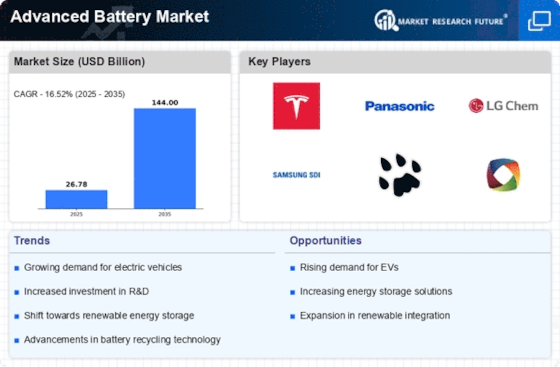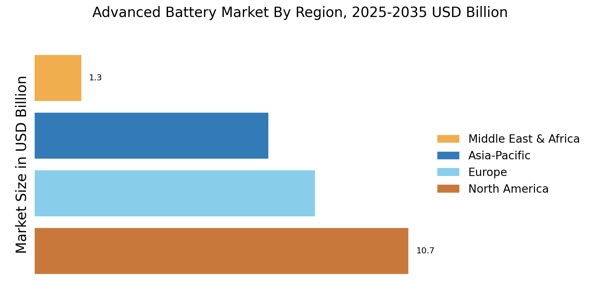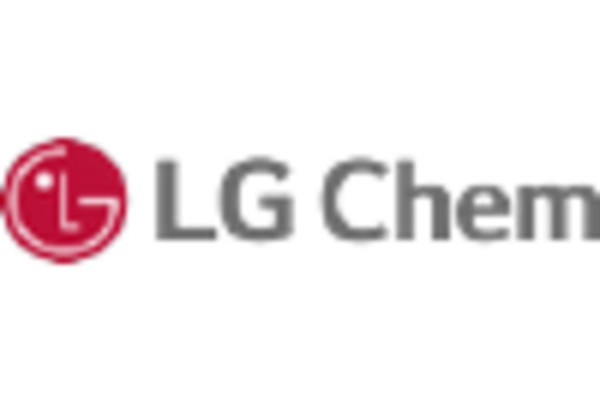Rising Demand for Electric Vehicles
The Advanced Battery Market is experiencing a notable surge in demand, primarily driven by the increasing adoption of electric vehicles (EVs). As consumers and manufacturers alike prioritize sustainability, the shift towards EVs is expected to accelerate. In 2025, the number of electric vehicles on the road is projected to exceed 30 million, necessitating advanced battery technologies that offer higher energy density and faster charging capabilities. This trend not only enhances the performance of EVs but also aligns with global efforts to reduce carbon emissions. Consequently, the Advanced Battery Market is likely to witness substantial growth as automakers invest heavily in battery research and development to meet these evolving consumer preferences.
Growth in Renewable Energy Storage Solutions
The Advanced Battery Market is significantly influenced by the increasing need for efficient energy storage solutions, particularly in the context of renewable energy sources. As solar and wind energy become more prevalent, the demand for advanced batteries that can store excess energy for later use is rising. In 2025, the energy storage market is anticipated to reach a valuation of over 20 billion USD, with advanced batteries playing a crucial role in this transformation. These batteries not only facilitate the integration of renewable energy into the grid but also enhance energy security and reliability. Thus, the Advanced Battery Market is poised for growth as stakeholders seek innovative storage solutions to support the transition to a more sustainable energy landscape.
Increased Investment in Research and Development
The Advanced Battery Market is witnessing a surge in investment directed towards research and development initiatives. Governments and private entities are recognizing the strategic importance of advanced battery technologies in achieving energy independence and sustainability goals. In 2025, global investments in battery R&D are projected to exceed 10 billion USD, reflecting a commitment to innovation and technological advancement. This influx of capital is likely to accelerate the development of next-generation batteries, which could offer enhanced performance and lower environmental impact. As a result, the Advanced Battery Market is expected to thrive, driven by a robust pipeline of innovative products and solutions that cater to diverse market needs.
Technological Advancements in Battery Manufacturing
The Advanced Battery Market is benefiting from rapid technological advancements in battery manufacturing processes. Innovations such as solid-state batteries and lithium-sulfur technologies are emerging, promising to deliver higher energy capacities and improved safety profiles. In 2025, the market for solid-state batteries alone is expected to grow at a compound annual growth rate of over 30%. These advancements not only enhance battery performance but also reduce production costs, making advanced batteries more accessible to a wider range of applications. As manufacturers continue to invest in research and development, the Advanced Battery Market is likely to evolve, offering more efficient and cost-effective solutions for various sectors, including automotive and consumer electronics.
Regulatory Frameworks Promoting Sustainable Practices
The Advanced Battery Market is increasingly shaped by regulatory frameworks that promote sustainable practices and encourage the adoption of advanced battery technologies. Governments are implementing policies aimed at reducing greenhouse gas emissions and enhancing energy efficiency, which often include incentives for the use of advanced batteries in various applications. In 2025, it is anticipated that more than 50 countries will have established regulations supporting battery recycling and sustainable sourcing of materials. These regulatory measures not only foster a favorable environment for the Advanced Battery Market but also drive innovation as companies seek to comply with evolving standards. Consequently, the market is likely to expand as stakeholders align their strategies with sustainability objectives.
.png)

















